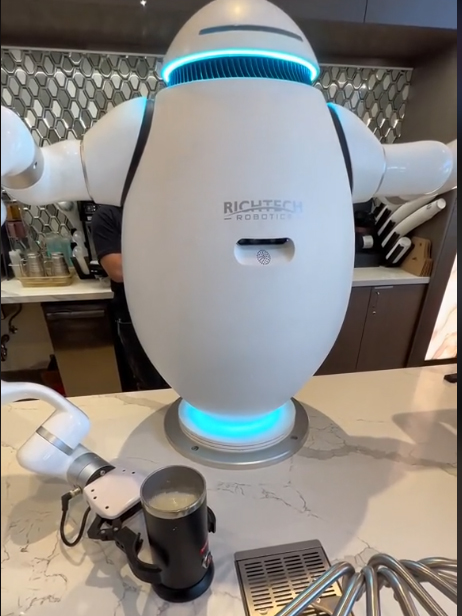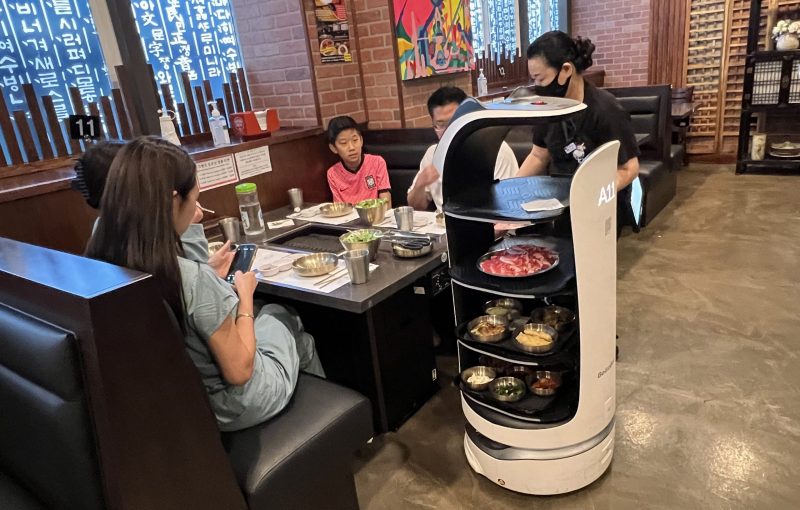Wagyu beef is ground into a blender, patties are grilled, and fries are crisped.
The burgers are completed through fully automated grilling and frying stations. Leading the charge in cooking the burgers is robot chef Flippy.
CaliExpress by Flippy, which opened earlier this year in Pasadena, is a pop-up burger restaurant run by artificial intelligence (AI). It’s a collaboration between Miso Robotics, the world’s first AI-powered robotic fry station, and biometric technology company PopID.
The menu includes burgers, cheeseburgers, lettuce wraps, fries, and drinks. When a customer places an order at the kiosk, AI facial recognition software completes the customer’s food selection and payment. Only the final wrapping of the burger is done by a single employee, and the rest is done by AI robots.

Food Tech has recently become one of the most powerful trends in the restaurant industry. A coffee shop in Monterey Park has a robot barista, Adam, to serve coffee, and the Italian chain Olive Garden has tabletop kiosks to pay for food.
The restaurant industry is speeding up the adoption of food technology due to labor shortages and rising labor costs. For example, Servi, a serving robot developed by Bear Robotics, is being used in restaurants nationwide. AI is also taking over kitchen tasks such as inventory management and ingredient preparation in restaurants.
Serving robots and delivery robots can also be found in Los Angeles Koreatown. Last month, Garfield delivery robots appeared in Koreatown waiting for a signal and became a hot topic. The delivery robot is made by Server Robotics which operates the delivery in cooperation with Uber Eats. Hanu K BBQ has been using two serving robots, Popo, since two years ago to bring ordered food to customers’ tables.

Food Tech market is growing exponentially every year as it takes over the restaurant industry. It was valued at $266.3 million in 2022 and is expected to reach $394.4 million by 2028, according to Deloitte.
Food Tech was also a key trend at last month’s National Restaurant Association Show in Chicago. A special pavilion for Food Tech showcased a variety of tech products that utilize technology and AI, from an eco-friendly deep fryer to a robotic chef that makes plant-based steaks. Cameras monitoring burger quality, software to automate invoices, and apps to add specific foods to menus were the ultimate in AI at the show.
Companies are also quickly adopting Food Tech. POS company Square made a splash with its own kiosks, and digital ordering company CloudKitchens launched a new POS system.
Another hot topic at the event was California’s fast-food workers’ minimum wage law.
California has raised the minimum wage for fast-food employees to $20, which has spurred the implementation of self-service kiosks at restaurants.
“Kiosks not only reduce labor costs but also increase profitability as customers order more,” said an industry insider. However, they added that it will take time for robots to expand to Koreatown restaurants due to the high initial cost of investment.
BY EUNYOUNG LEE, HOONSIK WOO [lee.eunyoung6@koreadaily.com]



![Green card interviews used as decoy for ICE arrests U.S. Immigration and Customs Enforcement (ICE) agents arrest a man after a hearing at an immigration court in Manhattan, New York, on Oct. 27. [REUTERS]](https://www.koreadailyus.com/wp-content/uploads/2025/12/1226-ICE-100x70.jpg)
